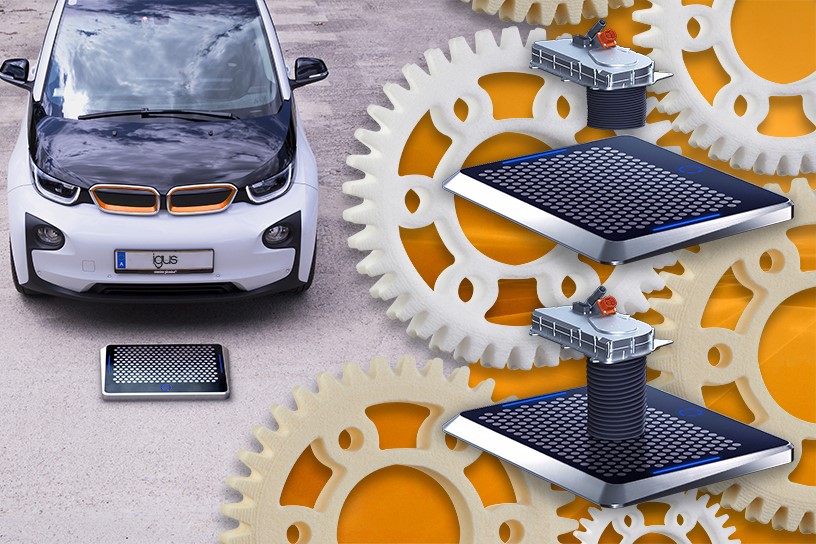Easelink, the Austrian developers of an electric vehicle charging system, is working with igus, an international advanced polymer supplier. The Austrian company is the developer of an automated conductive charging technology they call Matrix Charging.
Easelink needed an inexpensive and efficient method to test a wide variety of cogwheels to be used in the Matrix Charging system. Igus provided Easelink with its 3D printing expertise to 3D print various cogs to test for reliability and durability.

Cordless charging for electric cars
Easelink’s electric vehicle charging system has two parts: a charging connector and a charging pad.
The Matrix pad is mounted to the floor power grid and the charging connector is attached underneath the electric vehicle.
When a vehicle is parked over the Matrix Charging pad, the charging connector under the vehicle lowers to attach itself to the power supplying pad. The communication between the pad and the connector is carried out through a secured wireless connection.
Hermann Stockinger, the founder of Easelink, said, “with Matrix Charging, electric vehicles are charged automatically and without cables – this smart technology operates itself without user intervention.”
“From parking garages or drive-ins to private parking spaces or railway crossings – any time spent standing still can be used for charging the electric vehicle.”
The Matrix Charging system uses conduction method to charge vehicles, providing 43 kW (DC) or 22 kW (AC) of power.
3D printed gear wheels
igus has an online configurator which automatically generates CAD models once the user specifies the size, number of teeth and torque value of the gear wheel. The whole process of designing the cogs can be completed within seconds.
The development team at Easelink tested a wide variety of gears for the connector prototype using the igus’ configurator.
The gears were printed with SLS 3D printers and igus’ proprietary iglidur I6-PL polymer in print runs ranging between 24-72 hours. The polymer powder developed by igus for SLS 3D printing, is resistant to extreme temperatures (-40 to +80 C). iglidur I6 is also more durable than standard plastics, such as polyoxymethylene (POM) and has a bend strength of 49/38 MPa.
During testing, the prototype gears were rotated at 12 RPM, with an applied force of 5Nm torque.
The 3D printed gears made with iglidur I6-PL showed no noticeable signs of wear after a million cycles. In contrast, the milled gear wheels made from Polyoxymethylene (POM) were worn after 321,000 cycles, and completely broke down after 621,000 cycles.
3D printing in the automotive industry
While, the automotive industry is finding application for 3D printing in a relatively small number of end use components. However, prototyping and the production of tooling using additive manufacturing are both areas where the technology has proven benefits.
For example, Volkswagen recently produced 2,000 individual 3D printed parts for the prototype electric race car Volkswagen I.D. R. The 1:2 scale prototype for wind tunnel testing helped the automaker build a car with better aerodynamics and reduced weight.
GM’s Lansing Delta Township plant uses a 3D printed tool to align placement of the vehicle identification number on engines. The tool costs $3 to 3D print, versus $3,000 from the previous source. The Lansing plant has saved over $300,000 in three years by using AM.
The 3D printed gears made by igus demonstrate the importance of materials in additive manufacturing. While mass production in the automotive industry using AM is still on the distant horizon, applications that result in an improved component will continue to earn 3D printing a place in vehicles.
For more news from the automotive industry, subscribe to our 3D printing newsletter. You can also join us on Facebook and Twitter.
Looking for a job? Visit our 3D printing job site.
Featured image shows the Matrix Charging system by Easelink. Image via Electrive

